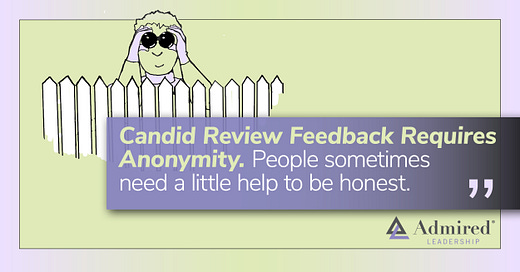People sometimes need a little help to be honest.
This is especially true when it comes to performance reviews. The suspicion that those on the receiving end of candid feedback might hold a grudge or seek retribution makes brutal honesty too risky.
Leaders who believe that good colleagues must learn to be brave enough to offer candid views regardless of the consequences live in a dream world. The unrealistic expectation that team members will find the courage to be honest without anonymity results in highly filtered commentary that skews toward useless.
Team members don’t get better without the unbridled criticism compiled in performance reviews. Review processes that involve everyone who works closely with the team member offer the richest insight. The only way to encourage honesty in peer-driven reviews is to give the reviewers the peace of mind anonymity creates.
Good leaders and organizations invest in data collection methods that ensure complete anonymity for those completing performance reviews. Anonymous data collection allows team members to feel safe when providing feedback without the fear of retaliation.
Where this data is housed in the future and who has access to it is also of grave concern. The best organizations often turn to third parties or a trusted guardian to keep this data secure from curious minds.
Performance review data often sets the tone for how colleagues share ongoing criticism. When they know they can periodically offer a frank and anonymous assessment of the overall work product of others, team members are more likely to provide actionable feedback in everyday settings. Anonymous performance reviews get team members into the habit of frank and candid evaluations throughout the year.
Team cultures benefit greatly from consistent and trusted methods for gathering performance feedback at all levels of the organization. The more performance review feedback is strictly confidential, the more candid the evaluations become.
As it turns out, confidentiality and honesty reinforce each other, making the other stronger.





Wow – this one set me off (as evidenced by the length of this post, LOL)! Totally on board with the confidentiality part of this post, but not the anonymity. Anonymity = Secrecy = Silos = Mistrust = Failing/Failed Culture. Employees have a fundamental right to know, ongoingly, where they stand with regards to how others perceive their performance so that they have a real choice in whether to improve, stay the same, or find employment happiness elsewhere. And their colleagues have a fundamental, human responsibility to authentically, ongoingly share and own their points of view. Of course, it takes time to build an effective culture that works this way, but if we stick with the notion that real relationships can’t be achieved in the workplace, that time never comes. I’ve worked in both types of organizations, and I can say firsthand that the old way is easier; it’s also sadder, more divisive, less fulfilling, and way less productive.
Another tricky thing with anonymous feedback in our small organization is that it is too easy to determine who provided the criticism because only one or two people are close enough to know those details. I like Kim Scott's radical candor approach.